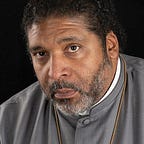In The Time Of Herod
“In the time of Herod…” the Christmas story says. When Jesus was born in Bethlehem, meanness had power. Now, as then, trouble is real, and people and problems that threaten our lives are real.
Understanding The Christmas story must always begin with and understanding of what it means to be in the time of Herod.
When I was in seminary and a biblical text started like this, we didn’t go any further until we understood the setting of the text — what the scholars call its “Sitz em Leben.” To discern the meaning of the story, we have to pay attention to the times in which it’s happening.
Pastoring has taught me that this is not only the case when interpreting the pages of the Bible, but also if we want to make some sense of the days and years of people’s lives. If we get to know something about their surroundings — what they have been through and under and even over, only then do we have a chance of understanding why they say what they say and believe what they believe.
The Romans gave Herod the title of “tetrarch” in Galilee. He didn’t win this position in an election; he was given the title, which afforded him power to oppress his own people.
Herod was made the sole ruler of Judea. He held a position he couldn’t handle and a distinction he didn’t deserve. Because Herod knew this, he was insecure with power, and this made him mean. It made him lie and compelled him to pay people off out of fear that he might be exposed as the fraud that he knew he was. This constant, existential fear made Herod paranoid. If you ever chose not to listen to him, he would call you weak.
The beginning of Herod’s reign was marked by violence. First, he had Hyrcanus, his competition, executed, making sure that no one else could claim his throne. In Jerusalem, Herod built a new market, an amphitheater, a theater, a new building where the Sanhedrin could convene, a new royal palace, and lastly, in 20 B.C. he started to rebuild the Temple. He was always building and putting his name on buildings.
Many of Herod’s projects engendered bitter hatred among his subjects. Herod’s projects cost the people what they didn’t have, and they resented his excessive taxation on the poor and working poor just so he could lavish the rich. They disliked Herod’s Greek taste, a preference he demonstrated not only in his building projects, but also in his transgressions of the Mosaic Law. He was a flamboyant cheater and womanizer, taking pride in the way he lived about the morays of common people.
When people complained about Herod’s reign, he sometimes would revert to violence, employing mercenaries and secret police to enforce order.
Sadly, the spirit of Herod still lives.
All around the world, from Brazil to Saudi Arabia to the United States if America, we’ve witnessed the emergence of strongman-type leaders who want to cripple democracy, undermine the human rights of people, and bluntly kill reporters. In 2018, the spirit of Herod still lives.
Thousands of immigrants are being illegally and unconstitutionally denied asylum application in the US, and now little babies are dying of thirst in the midst of this oppression. The spirit of Herod still lives.
When the wealthy receive massive tax cuts while at the same time the President demands $5 billion for an unnecessary wall and refuses workers a living wage, the spirit of Herod still lives.
When thousands of families can lose their homes in the fires of California while the President of our country blames people for not raking the forest floors rather than the corporations that are fueling global warming, the spirit of Herod still lives.
When a judge in Texas can rule to undermine healthcare for millions of families and those with preexisting conditions, despite the fact the Constitution says we should promote the general welfare and Jesus said we are supposed to care for the sick — all so that corporations can make more money, the spirit of Herod still lives.
And yet, it was in the time of Herod that God began preparing the way for Jesus and for deliverance. This is the good news of Christmas in the time of Herod. In the face of our enemies and in the midst of our problems, God shows up to set us free. There is no “peace on earth and good will to all people” apart from the angels who showed up to tell migrant farm workers that their Savior had been born. There is no “joy to the world” apart from the message that politics of Herod’s are numbered and a new politics is getting born. We who would celebrate the new born King should consider what it means that we wait to hear the angels sing in the time of Herod. In fact, maybe the point of the text is that we must choose love, truth, mercy, and justice. We must embrace the politics of God and reject the politics of Herod.
